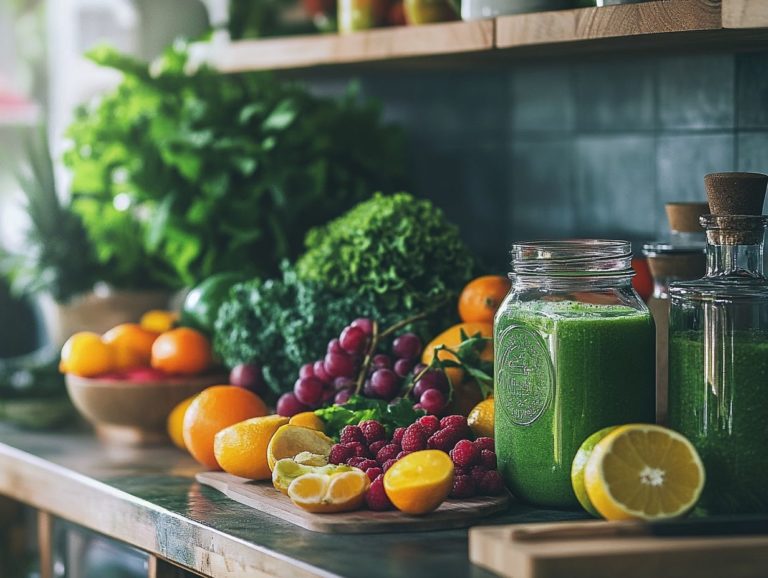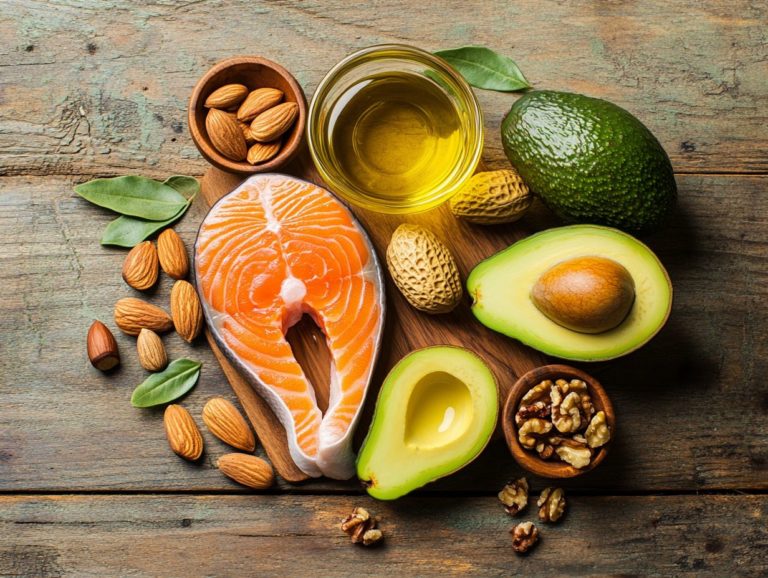The Real Truth About ‘Superfoods’
Superfoods have surged in popularity within the health community, each promising a treasure trove of nutritional benefits in just one bite.
But what exactly are these superfoods, and do they truly deserve the accolades? This article will clarify their definition and categories, delve into their authentic health benefits, and debunk the myths that often surround them.
You’ll discover practical tips for seamlessly integrating these nutritional powerhouses into your diet while remaining aware of any potential risks.
Join in as the truth about superfoods is unveiled, revealing how they can contribute to your journey toward better health.
Contents
Key Takeaways:
- Superfoods aren’t magic; they complement a balanced diet.
- The term “superfood” is often more about marketing than science.
- Consult a healthcare professional before major dietary changes.
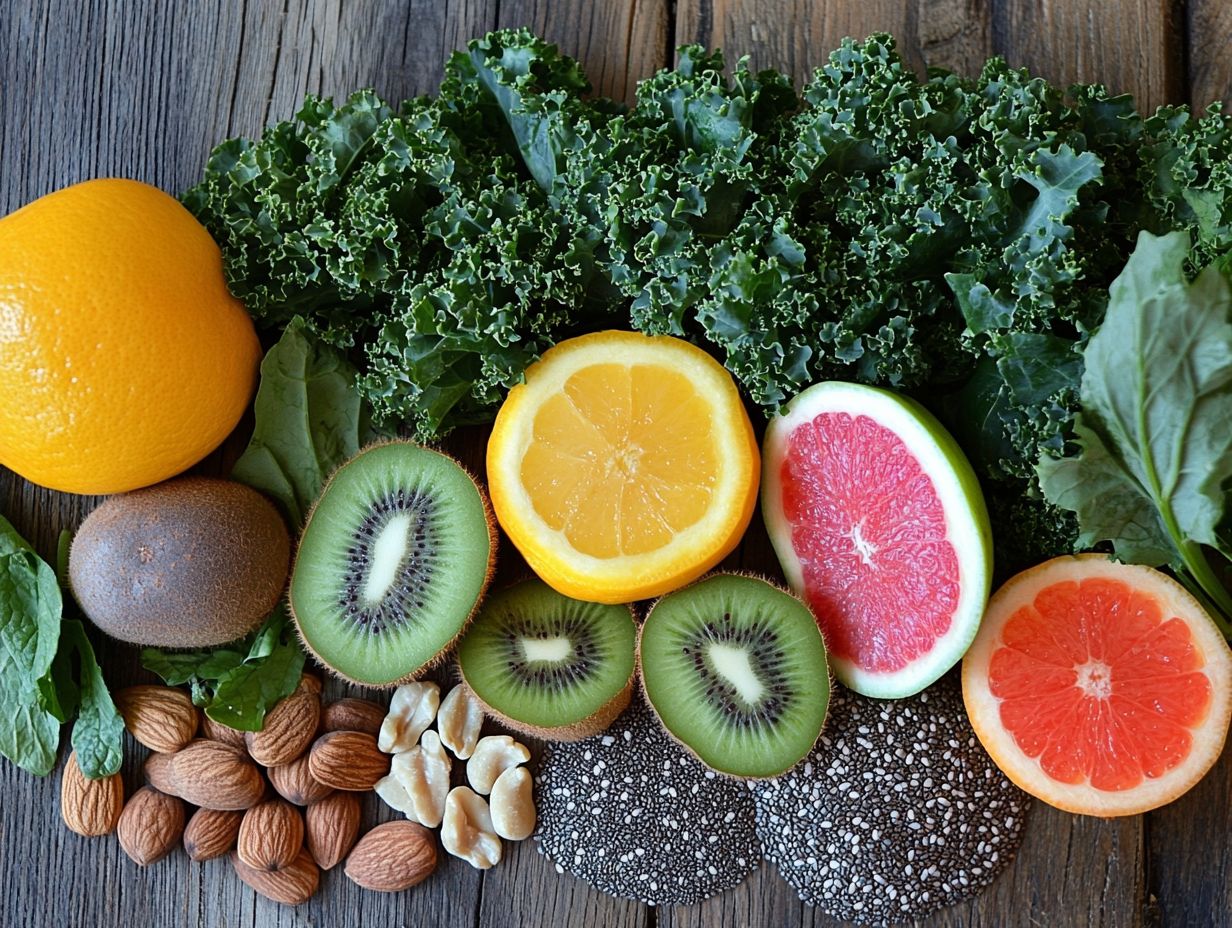
Understanding Superfoods
Grasping the concept of superfoods is crucial for anyone aiming to live a healthier lifestyle.
Superfoods are distinguished by their high concentrations of antioxidants, vitamins, and minerals. They offer substantial nutritional benefits that can aid in disease prevention and promote a balanced diet.
Foods like pomegranate juice, green tea, and dark green leafy vegetables not only enhance overall health but also play a vital role in contemporary dietary trends centered around plant-based eating.
Defining and Categorizing Superfoods
Defining and categorizing superfoods requires you to explore their health claims and the natural substances in foods that benefit health. These foods stand out thanks to their remarkable concentrations of vitamins, minerals, and antioxidants, all of which can significantly enhance your well-being.
Take chia seeds, for instance; they are renowned for their high healthy fats found in certain foods that are good for the heart and fiber, making them a stellar choice for heart health and digestion. Similarly, broccoli is a true powerhouse among vegetables, brimming with vitamins K and C that support immune function and bone health.
Then there s cinnamon, celebrated not just for its rich flavor but also for its beneficial properties that may help regulate blood sugar levels. These tasty examples show how fruits and veggies can boost your health!
Benefits of Superfoods
The benefits of superfoods are extensive, offering you essential nutritional advantages and playing a key role in disease prevention, making them essential for a healthy lifestyle.
These nutrient-dense foods are brimming with antioxidants, healthy fats, and a rich array of vitamins and minerals that enhance your overall well-being.
By incorporating superfoods such as pomegranate, avocados, and green tea into your diet, you can effectively combat free radicals and support immune function, ultimately paving the way for optimal health.
Nutritional and Health Advantages
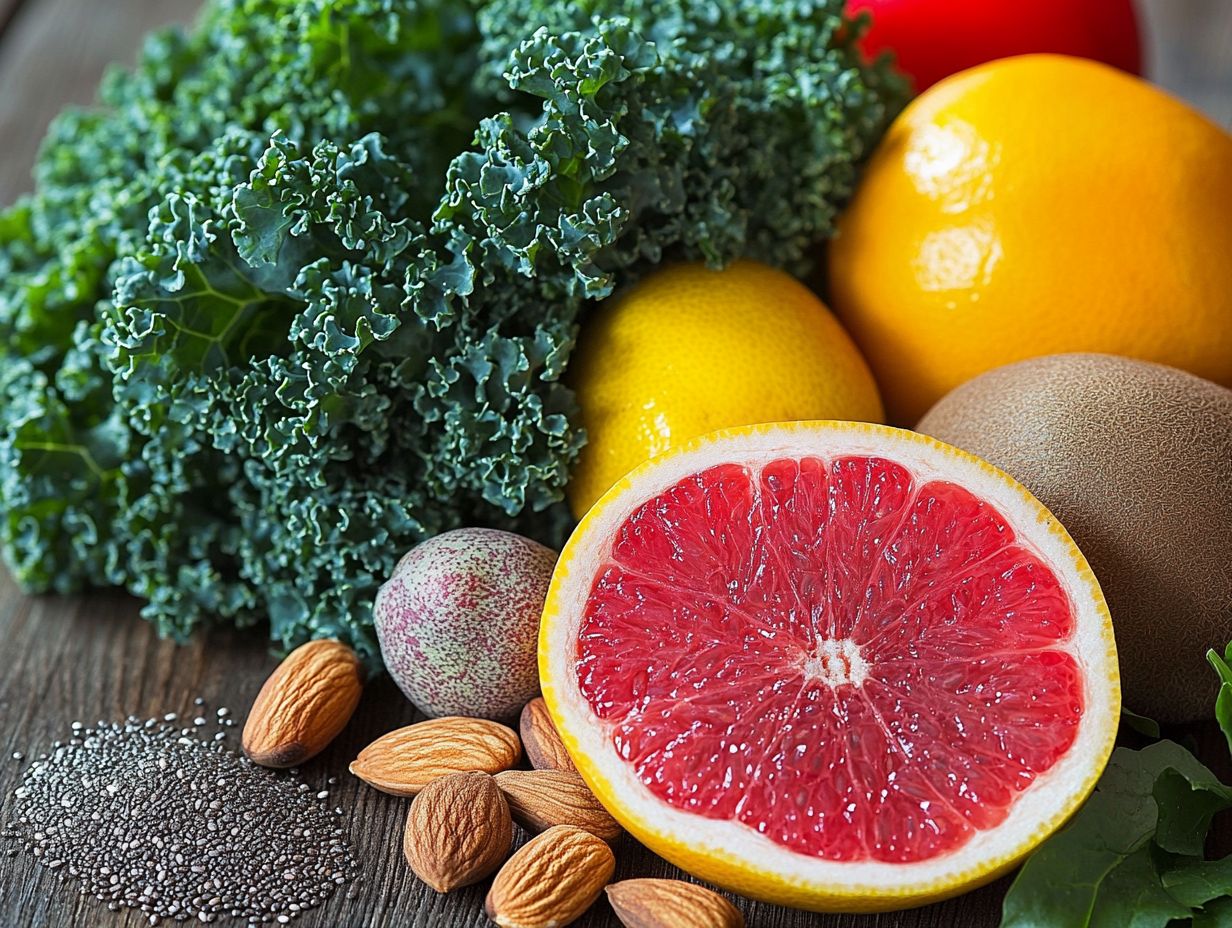
The nutritional and health advantages of superfoods are truly remarkable. They offer you a rich array of essential vitamins, minerals, and antioxidants that significantly enhance your overall well-being.
Take blueberries, for instance. Their high vitamin C and antioxidant content helps neutralize free radicals, effectively reducing inflammation and lowering your risk of chronic diseases.
You can also elevate your diet by incorporating leafy greens like kale, which is bursting with vitamins A, C, and K nutrients that fortify your immune system and bolster bone health.
Quinoa is also noteworthy; it s not just a complete protein source, but it also provides fiber that promotes healthy digestion.
To make the most of these superfoods, consider different cooking methods. Steaming vegetables rather than boiling them can help preserve their nutrients, maximizing their health benefits. This way, every meal you prepare can contribute meaningfully to a balanced, health-promoting diet.
Don’t miss out! Explore your local grocery store for these superfoods and make a delicious change to your diet today!
Myths and Misconceptions About Superfoods
Myths and misconceptions surrounding superfoods often arise from exaggerated health claims and aggressive marketing tactics. This can leave consumers feeling bewildered.
While superfoods like quinoa and kale offer remarkable health benefits, it’s essential to distinguish between genuine nutritional advantages and misleading claims that may be amplified for profit.
By understanding these misconceptions, you empower yourself to make informed dietary choices grounded in evidence rather than falling prey to marketing hype.
Debunking Common Claims
Debunking the common claims surrounding superfoods invites you to explore the scientific evidence that underpins their alleged health benefits.
Take acai berries and kale, for example. Many tout these foods as miraculous boosters of overall wellness. However, a closer examination reveals a spectrum of conclusions in research studies.
While it’s true that these superfoods are packed with vitamins and minerals, their actual impact on health is often exaggerated.
Antioxidants, found in these foods, help protect your body from damage by neutralizing free radicals. This may alleviate oxidative stress.
True good nutrition stems from a balanced diet rich in various nutrients, rather than placing all your hopes on trendy ingredients.
Incorporating Superfoods into Your Diet
Incorporating superfoods into your diet is a simple yet impactful way to embrace a healthier lifestyle. Nutrient-dense options like almonds, avocados, and dark green leafy vegetables can elevate your meals while delivering numerous health benefits.
Exploring different cooking methods enhances flavor and preserves nutrients, making these superfoods a delightful and convenient choice for those who prioritize their well-being.
Tips for Choosing and Preparing Superfoods
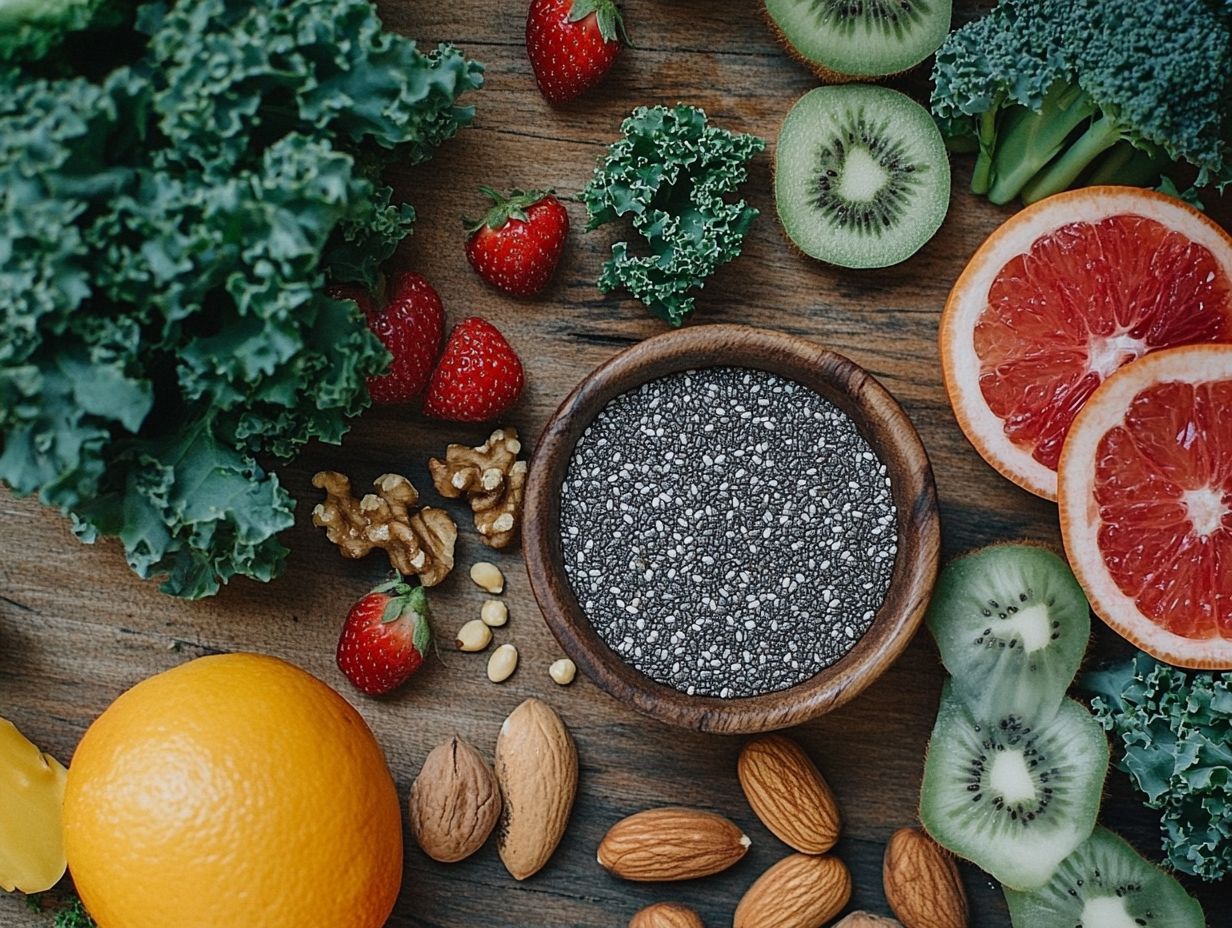
When selecting and preparing superfoods, prioritize freshness and adopt proper cooking techniques to fully harness their nutritional benefits.
Choose seasonal produce to ensure you’re selecting foods at their peak ripeness, which often translates to elevated nutrient levels and enhanced flavor.
Opt for organic options, such as organic apples, to avoid harmful pesticides. The cooking methods you choose like steaming or saut ing also play a vital role in nutrient retention.
For instance, quick techniques like blanching briefly expose superfoods to heat, helping lock in essential vitamins while making them easier to digest.
Paying attention to these details boosts health benefits and heightens your overall enjoyment of these powerhouse ingredients.
Potential Risks of Superfoods
While superfoods often receive accolades for their impressive health benefits, it’s important to be aware of potential risks and side effects that can arise from excessive consumption.
Some superfoods, when eaten in excess, may lead to unwanted consequences, such as digestive discomfort or adverse interactions with medications.
By being aware of these potential pitfalls, you can fully enjoy the advantages of superfoods while safeguarding your health.
Side Effects and Interactions to Consider
Side effects and interactions linked to superfoods are essential factors to consider for your overall health and well-being.
Take turmeric, for example. While it s celebrated for its anti-inflammatory benefits, it can sometimes upset your stomach or interact with blood thinners, potentially raising your bleeding risk.
Similarly, high doses of fish oil, often praised for promoting heart health, can lead to gastrointestinal issues or fluctuations in blood pressure, especially if you’re on hypertension medication.
Don’t forget that certain superfoods, like garlic, can enhance the effects of anticoagulant drugs, which could be risky for anyone with bleeding disorders.
It s crucial to approach these nutritional powerhouses with care and consult your healthcare provider. Stay informed and enjoy your superfoods safely!
Superfoods: The Key to a Healthy Diet
Superfoods play a crucial role in a healthy diet. They offer unique nutritional benefits that boost your wellness.
Incorporating these nutrient-dense foods into your meals can enhance your body’s ability to fend off diseases. These foods help maintain your peak health.
Take blueberries, for instance. Adding them to your diet gives you a powerful boost of antioxidants that fight oxidative stress. Quinoa is another gem, serving as a complete protein that provides all the essential amino acids you need.
Don t overlook leafy greens like kale and spinach. They offer vital vitamins and minerals that promote heart health and improve digestion.
By recognizing how these superfoods complement other dietary elements, you can create a well-rounded menu that supports your long-term wellness and vitality.
Frequently Asked Questions
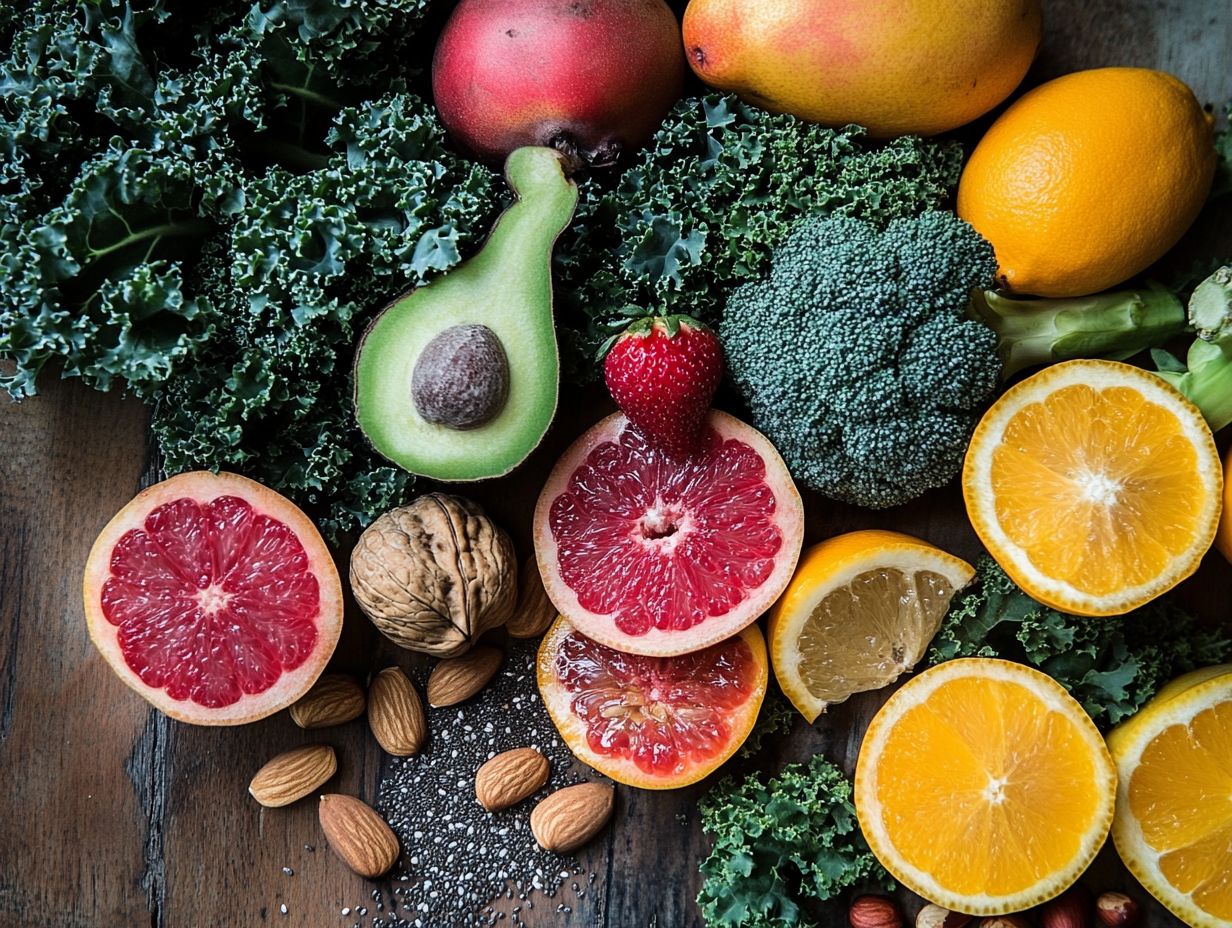
What are “Superfoods” exactly?
“Superfoods” refer to foods that are highly nutritious and beneficial for overall health and well-being. They are rich in vitamins, minerals, antioxidants, and other essential nutrients that support a healthy body and mind.
What are some examples of “Superfoods”?
Examples of “Superfoods” include berries, leafy greens, nuts, seeds, fatty fish, quinoa, and avocado. These foods are nutrient-dense and provide health benefits like promoting heart health, boosting the immune system, and improving brain function.
Do “Superfoods” have any negative effects?
Though “Superfoods” offer many health benefits, they may have potential negative effects if consumed excessively. Some may cause digestive issues or allergic reactions in certain individuals. It’s best to consume these foods in moderation and consult a healthcare professional if you have concerns.
Are “Superfoods” necessary for a healthy diet?
No, “Superfoods” aren’t necessary for a healthy diet. While they offer numerous health benefits, they are not the only source of essential nutrients. A balanced diet with a variety of fruits, vegetables, whole grains, and lean proteins can provide all the necessary nutrients.
Can “Superfoods” cure diseases?
No, “Superfoods” cannot cure diseases. They may contribute to overall well-being but are not a replacement for medical treatments. Always consult a healthcare professional for prescribed treatments for medical conditions.
Are all “Superfoods” expensive and hard to find?
No, not all “Superfoods” are expensive or hard to find. Some superfoods can be pricey, but many affordable options exist in local supermarkets or farmer’s markets. Many whole foods, like fruits, vegetables, and grains, are also considered “Superfoods” and are widely accessible.


